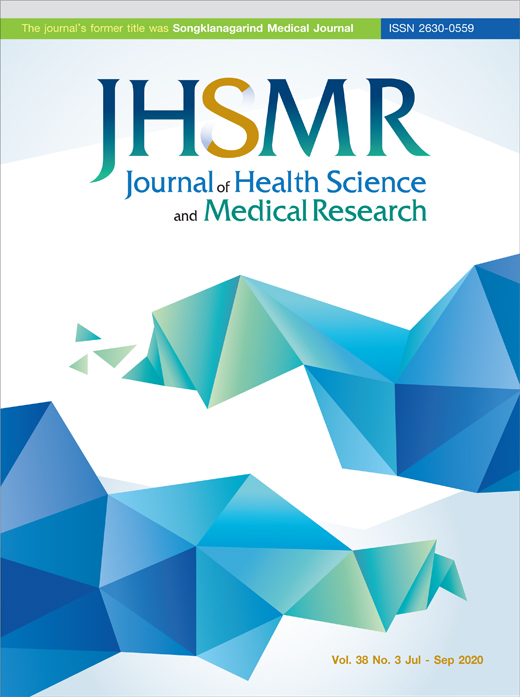Association between Specific Single Nucleotide Polymorphisms, Clinical Features and Severe Hepatitis in Dengue Patients
DOI:
https://doi.org/10.31584/jhsmr.2020734Keywords:
dengue fever, dengue hemorrhagic fever, genetic susceptibility, hepatitisAbstract
Objective: This study aimed to identify predictors associated with severe hepatitis, especially genetic features, among
dengue patients.
Material and Methods: One hundred seventy nine dengue patients from the years 2009-2014 were identified from
the hospital inpatient database. Their baseline characteristics, laboratory data and hospital course were recorded and
analyzed. Seventy five patients had been tested for specific single nucleotide polymorphisms either the Janus kinase 1 (Jak1) or the cluster of differentiation 209 genes.
Results: Most of the identified study patients were female (64.8%), 74.3% had elevated liver enzymes, 48.6% of whom showed mild hepatitis. Serum aspartate aminotransferase was predominate over serum alanine aminotransferase (ALT) in most patients. Myalgia was the most common initial presentation (65.4%). Severe hepatitis (ALT ≥10 times the upper limit of normal) was associated with a higher intensive care unit (ICU) admission rate (26.3%) and complications (36.8%). There was significant elevation of liver enzymes among patients with initial platelets <50,000/microliter and albumin <3.5 gram (g)%. An initial serum albumin <3.5 g% had an odds ratio=4.16, 95% confidence interval 1.41-12.27 in association with severe hepatitis. No difference in specific single nucleotide polymorphisms was found between the severe liver involvement group and the mild group.
Conclusion: Liver involvement among dengue infection is frequent, mostly manifesting as mild transaminitis. Patients with severe hepatitis usually have poorer clinical outcomes due to complications and often require ICU admission. Initial serum albumin <3.5 g% appears to be a predictor associated with severe hepatitis and bad outcomes. The genetic susceptibility needs more study.
References
2. Bureau of Vector Borne Diseases MoPH, Thailand. Thailand’s dengue situation in 2013 [homepage on the Internet]. Nonthaburi: Department of Disease Control, Ministry of Public Health; 2013 [cited 2014 Feb 15]. Available from: http://www. thaivbd.org/n/histories/view/2427
3. Annual report on detection of serotyping dengue virus in Thailand: 2005-2012 [monograph on the Internet]. Nonthaburi: Center of Infectious Diseases Information and Vector-Borne Diseases, Department of Medical Sciences, Ministry of Public Health; 2014 [cited 2014 Feb 25]. Available from: http:// webdb.dsmc.moph.go.th/ifc.nih/ez.mm_main.asp
4. World Health Organization. Dengue: guidelines for diagnosis, treatment, prevention and control [monograph on the Internet]. Geneva: WHO; 2009 [cited 2014 Feb 15]. Available from: http://www.who.int/tdr/publications/documents/denguediagnosis. pdf?ua=1
5. Potts JA, Rothman AL. Clinical and laboratory features that distinguish dengue from other febrile illnesses in endemic populations. Trop Med Int Health 2008;13:1328-40.
6. Rothman AL, Srikiatkhachorn A, Kalayanarooj S, Thomas SJ. Dengue virus infection: clinical presentation and diagnosis [homepage on the Internet]. Alphen aan den Rijn: Wolters Kluwer; 2013 [cited 2014 Mar 6]. Available from https://www. uptodate.com/contents/dengue-virus-infection-clinicalmanifestations- and-diagnosis
7. Souza LJ, Alves JG, Nogueira RM, Gicovate Neto C. Bastos DA, Siqueira EW, et al. Aminotransferase changes and acute hepatitis in patients with dengue fever: analysis of 1,585 cases. Braz J Infect Dis 2004;8:156-63.
8. De Souza LJ, Nogueira RM, Soares LC, Soares CE, Ribas RF, Alves FP, et al. The impact of dengue on liver function as evaluated by aminotransferase levels. Braz J Infect Dis 2007;11:407-10.
9. Trung DT, Thao le TT, Hien TT, Hung NT, Vinh NN, Dieu Hien PT. Liver involvement associated with dengue infection in adults in Vietnam. Am J trop Med Hyg 2010;83:774-80.
10. Wahid SF, Sanusi S, Zawawi MM, Ali RA. A comparison of the pattern of liver involvement in dengue hemorrhagic fever with classic dengue fever. Southeast Asian J Trop Med Public Health 2000;31:259-63.
11. Parkash O, Almas A, Wasim Jafri SM, Hamid S, Akhtar J, Alishah H. Severity of acute hepatitis and its outcome in patients with dengue fever in a tertiary care hospital Karachi, Parkistan (South Asia). BMC Gastroenterol 2010;10:1-8.
12. Seneviratne SL, Malavige GN, de Silva HJ. Pathogenesis of liver involvement during dengue viral infections. Trans R Soc Trop Med Hyg 2005;100:608-14.
13. Lee LK, Gan VC, Lee VJ, Tan AS, Leo YS, Lye DC. Clinical Relevance and discriminatory value of elevated liver aminotransferase levels for dengue severity. PLOS Negl Trop Dis 2012. doi: 10.1371/journal.pntd.0001676.
14. Tan SS, Bujang MA. The clinical features and outcomes of acute liver failure associated with dengue infection in adults: a case series. Braz J Infect Dis 2013;17:164-9.
15. Gasperino J, Yunen J, Guh A, Tanaka KE, Kvetan V, Doyle H. Fulminant liver failure secondary to haemorrhagic dengue in an international traveler. Liver Int 2007;27:1148-51.
16. Ling LM, Wilder-Smith A, Leo YS. Fulminant hepatitis in dengue haemorrhagic fever. J Clin Virol 2007;38:265-8.
17. Giri S, Agarwal MP, Sharma V, Singh A. Acute hepatitis failure due to dengue: a case report. Cases J 2008;1:204.
18. Almas A, Parkash O, AkhterJ. Clinical factors associated with mortality in dengue infection at a tertiary care center. Southeast Asian J Trop Med Public Health 2010;41:333-40.
19. Thomas L, Brouste Y, Njioullah F, Hochedez P, Hatchuel Y, Moravie V, et al. Predictors of severe manifestations in a cohort of adult dengue patients. J Clin Virol 2010;48:96-9.
20. Manolio TA, Guttmacher, Alan E, Manolio, Teri A. Genomewide association studies and assessment of the risk of disease. N Engl J Med 2010;363:166–76.
21. Lan NTP, Hirayama K. Host genetic susceptibility to severe dengue infection. Trop Med Health 2011;39:73-81.
22. Silva LK, Blanton RE, Parrado AR, Melo PS, Morato VG, Reis EA, et al. Dengue hemorrhagic fever is associated with polymorphisms in JAK1. Eur J Hum Genet 2010;18:1221-7.
23. Sakuntabhai A, Turbpaiboon C, Casademont I. A variant in the CD209 promoter is associated with severity of dengue disease. Nat Genet 2005;37:507-13.
24. McGreal EP, Miller JL, Gordon S. Ligand recognition by antigen- presenting cell C-type lectin receptors. Curr Opin Immunol 2005;17:1.
























